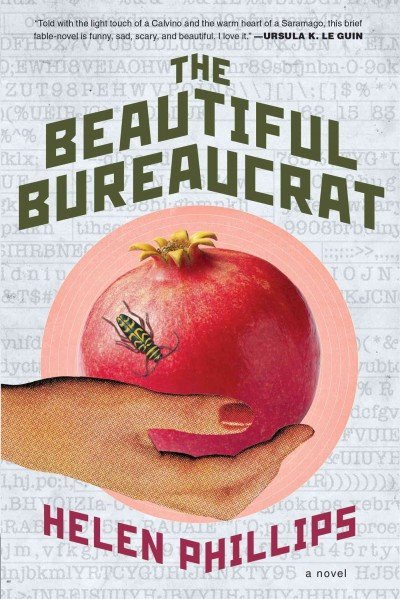The Beautiful Bureaucrat by Helen Phillips came in for me at the library last week. I would have preferred to read this one in October, when the weather is a little crisper and the atmosphere lends itself a bit better to weird and unsettling stories. But when I saw that 44 people were waiting for copies of it behind me, I figured I’d better read it quickly and set it back out into the world, otherwise it would be quite a while before it got back in my hands.

Very quick summary: Josephine Newbury is rescued from 18 months of unemployment by a new job entering stacks of files into “The Database.” She’s grateful for employment, but shortly after beginning work, strange things start to happen. Her boss appears faceless. A colleague knows details about her life that Josephine doesn’t remember sharing. Painters are expected who never arrive. She begins to notice unsettling patterns in the numbers she’s entering into The Database. And her husband disappears without explanation.
It’s only 177 pages long, but there’s so much to unpack and digest. You could explore the themes of fertility and creation. You could ponder what it has to say about bureaucratic jobs and how they have the ability to slowly kill the souls of employees. But the theme that interested me most was that of individualism, and personal destiny verses free will.
In 1948, Bertram Forer conducted a psychological study. He assembled a personality assessment – cobbled together from horoscopes published in various magazines published at that time. The text read:
“You have a great need for other people to like and admire you. You have a tendency to be critical of yourself. You have a great deal of unused capacity, which you have not turned to your advantage. While you have some personality weaknesses, you are generally able to compensate for them. Your sexual adjustment has presented problems for you. Disciplined and self-controlled outside, you tend to be worrisome and insecure inside. At times you have serious doubts as to whether you have made the right decision or done the right thing. You prefer a certain amount of change and variety and become dissatisfied when hemmed in by restrictions and limitations. You pride yourself as an independent thinker and do not accept others’ statements without satisfactory proof. You have found it unwise to be too frank in revealing yourself to others. At times you are extroverted, affable, and sociable while at other times you are introverted, wary, and reserved. Some of your aspirations tend to be pretty unrealistic. Security is one of your major goals in life.”
Forer then gave this paragraph to his students, and implied that they were reading an individual personal assessment of their personality. He asked each student to rate how well they recognized themselves in the assessment on a scale from 1 to 5, 5 being strongly recognize.
The students gave the assessment an average rating of 4.3 out of 5. This experiment was repeated hundreds of times over multiple decades with the same results. The vast majority of subjects recognized themselves in this universal description. (Talk about summing up the human condition, eh?)
In The Beautiful Bureaucrat, Helen Phillips brilliantly uses this description, told to Josephine as a palm read fortune from a waitress at a diner. As the story progresses and Josephine finds herself struggling to figure out her role in The Database and the effect she’s having on the world, phrases from this fortune come back to haunt her. She’s deep in personal turmoil over the influence of her actions at work and her husband’s disappearance, and she begins to read meaning and significance into everything around her – struggling with what things she can and cannot control.
Without getting into too many spoilers – the lines of the fortune and the work that Josephine does for The Database weave together into themes of personal choice verses destiny. How much influence do our actions have on actual outcomes? Is she a mindless cog in a machine, exactly the same as every other Bureaucrat employed at The Database, or is she an individual: unique and valuable? Who or What is controlling our destiny? Are there things that we have to accept, because nothing we can do will change them?
This is an engaging, short novel, and it’s worth reading. I’d recommend it when you’re in the mood for something short and weird – it sets an eerie mood that reminds me of classic, gothic short stories. It would also be an excellent book club discussion selection – short, but with so much to talk about. (Also, if you’re like me and discovered that you didn’t previously know how to spell bureaucrat, writing it out this many times in a review will teach you the spelling once and for all.)
Many wonderful bloggers have shared their insights about this one, and helped encourage me to read it:
- The Avid Reader
- Bookish Tendencies
- The Daily Dosage
- Estella’s Revenge
- Malcolm Avenue Review
- Outlandish Lit
- River City Reading
- Sarah’s Book Shelves
- Shaina Reads
- The Socratic Salon discussion
//
Affiliate links to buy this book: IndieBound | Amazon
Author photo by Andy Vernon-Jones.

Great review! This sounds like a suspenseful read, I hadn’t actually heard of it, it’s pretty new right? Now I want to know what’s going on with the Database and the main character’s individuality (or not)!
Thank you Bina!
Yes, it’s only been out for about a month. If you get a chance to read this one, I hope you enjoy it! It’s very short, so it’s easy to pick up and read quickly too.
Ooooh, I didn’t know that the fortune was drawn directly from a psych study! You’ve got my nerd senses tingling. :)
Awesome review! I think you touched on some unique points here. I’d definitely dig a book club reading of this.
OH, and many thanks for the link-up!
I randomly stumbled into the study in another book I’m reading – it was so awesome to discover it at the exact time I was reading TBB. Serendipitous! Reading about the study was so fascinating, and made The Beautiful Bureaucrat even more interesting to me.
PS re: link – of course! My pleasure.
Me, either! Leave it to Emily to bring something new and smart to the table. There was a shit-ton (excuse my sailor’s mouth) to mine on this one and while I enjoyed it I just didn’t have the gumption. I loved the mystery aspect of it and wanted more of that less pomegranate and cockroach symbolism. What a whiner! :) I love Phillips’ writing and despite my mixed feelings would definitely try her work again, so I suppose it was a success even with me! (Thanks for the shouty, by the way, that was very nice)
The great thing about this one is that it’s so short and fast – so even if you don’t end up loving it, it usually holds at least something to chew on for a while. I wish I could have saved it for the October readathon – it would be the perfect short read on a crisp October readathon day. But alas – library hold lists wait for no woman.
Exactly. I enjoyed it enough, but didn’t love it, but it being short and swift made it more enjoyable for me. And I don’t mean that in a negative way. But if it had been 450 pages long, I would have had issues. :)
Ugh, those library hold lists!